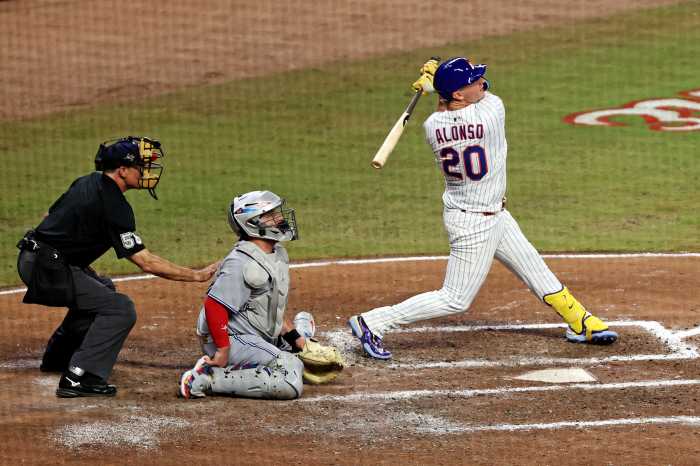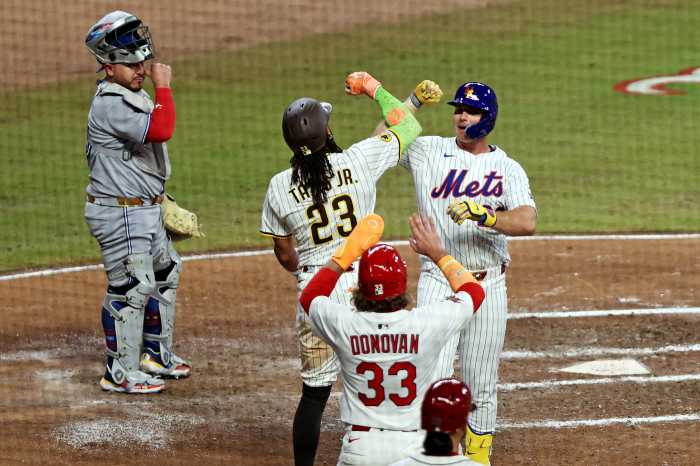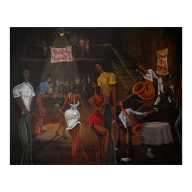At the top of the fifth inning in the Mets’ 4-2 win over the Phillies on Thursday, starting pitcher Max Scherzer was seen having a heated discussion with home plate umpire Tripp Gibson. Given Scherzer’s track record with on-field discussions with umpires this year, many expected the worst, but the actual content of the conversation was different than most Mets fans imagined.
“You’re supposed to get eight warm-up pitches [between innings], and I had seven and I asked, you know, can I get the eighth pitch? You know, can I do my normal routine warm-up?” Scherzer explained.
However, Gibson was adamant that Scherzer not throw his final pitch because the time elapsed between innings would then exceed the set timeframe required by MLB officials under the new rules.
“And he’s telling me, ‘It’s the clock. It’s the clock'” continued Scherzer. “You know, that’s what’s so frustrating is look, I’m doing my normal routine. Why do we need to step through the game and have the umpires change routines when it’s not my fault what’s going on here?”
From Scherzer’s point of view, if he is not the cause of any delay between innings, he should be given the ability to throw his normal allotment of pitches and complete his normal routine to ensure he’s ready for the next inning.
“I’m talking to Trip and he, you know, he’s sitting there saying like, I can’t do anything about it because if I let you throw the pitch then, you know, MLB gets mad at him,” explained the Mets ace.
“So this goes back to, why do we need a pitch clock for that situation? If I throw one more pitch then I’m one second slower. Like why can’t the umpire have discretion in that situation? To allow a pitcher to throw his eight normal warmup pitches? Why do we have to be so anal about this to have the clock in everybody’s face, shoved everybody’s face, and try to step out every little single second that’s going through the game.”
While Scherzer was not upset about the pitch clock enforcement during the innings themselves, he believes that there is no need for the clock to be so rigid in between innings. This time, it seems like the umpires are actually on the Mets’ pitcher’s side.
“It’s situations like that that really are frustrating for not only pitchers players, even the umpires,” he said. “That’s what Tripp says, like Trip’s handcuffed. Why is Tripp handcuffed to not allow something normal, a normal routine? Why can’t Tripp make that call?”
“So, you know, he said, thank you for speaking up for the umpires because the umpires want to have that discretion. They want to allow the game to be normal, but the umpires are frustrated, as we are, that the game is not normal, that we’re just living and dying by the clock. And so, you know, that was our conversation. I said I’ll speak for you… We’re way too far, you know, thinking about the clock in every single situation instead of letting the players have their routines.”
While Scherzer said nothing about the connection between the pitch clock and pitcher health, the increased injuries this season have led many to suggest that there is a connection.
MLB officials and many fans have been happy with the quicker pace of play this season, but the league will undoubtedly have to discuss whether or not there can be any increased flexibility in pitch clock enforcement going forward. Perhaps that means turning it off between innings or in the late innings of games or maybe it means lengthening the pitch clock a few seconds.
Whatever direction the league chooses to go in, it’s clear that the new rules are still taking some getting used to for veterans like Scherzer and, apparently veteran umpires as well.
When asked if he would always be awarded eight pitches in the past regardless of timing, Scherzer exclaimed, “Oh 100% 100%.”
Maybe him speaking up will help ensure that he can get those eight pitches in the future as well.
For more Mets coverage, visit amNY Sports
































